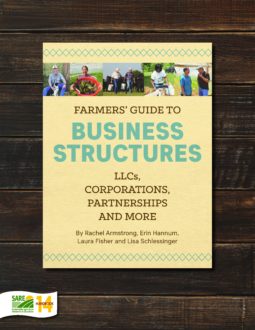Obtain required licenses and permits
As mentioned above, certain registrations, licenses and permits may be required for sole proprietorships and general partnerships. These include the DBA registration form with your state or county agency, should you choose to use
a name other than the name of the owners. In addition, most cities and many counties require all businesses to register with them and get a business license or a tax registration certificate, which may also require the business to pay a minimum tax. Also, if the farm operation has employees, it must obtain an Employer Identification Number (EIN) with the IRS. This is used for monitoring and paying required employment taxes. States may also require the farm business to get a seller’s license before selling anything to the public, and the local planning board may require the farm business to have a zoning permit depending on the location of the farmland. All these forms are pretty straightforward.
File the proper tax forms with the IRS
Neither a sole proprietorship nor a general partnership is a separate tax entity. It is considered one and the same as its owners. This is what the IRS calls a “pass- through entity.” In effect, the partnership itself does not pay any income taxes on the business’s profits. Business income simply passes through the business to the owner(s). Each owner will report his or her share of the profits (or losses) on his or her individual income tax return. Basically, the farm operation’s profits or losses are combined with the total tax situation of the individual owner(s). Partners may end up paying different tax rates depending on their overall financial situation or tax basis. While this is not a tax guide, the following provides a breakdown of the key tax forms that must be filed. This is not a comprehensive list of tax forms needed by a farm business, as other forms may be required depending upon employment and other issues. Be sure to talk with an accountant or tax attorney to confirm you are filing all the forms required based on your farm operation.
Sole proprietorship tax filings with the IRS
Individual owners must file Form 1040, “U.S. Individual Income Tax Return,” along with any relevant schedules, which may include Schedule F, “Profit or Loss from Farming,” and, if required, a separate Schedule SE, “Self-Employment Tax,” to pay self-employment taxes.
If the farm operation is run by spouses, there are other options. If the spouses meet the criteria of a qualified joint venture, or if they live in one of nine community property states, the spouses can choose to pay taxes on the farm business’s
income as a sole proprietorship. If this is the case, both spouses would need to elect the qualified joint venture status on Form 1040. The spouses would then need to file relevant schedules, most likely including Schedule F and, if required, a separate Schedule SE. Otherwise, the spouses would file as a partnership, which is explained below. It’s best to consult with your tax accountant or tax attorney before making this determination and decision, as there are financial implications.
In addition, the individuals must make quarterly estimated tax payments to the IRS each year. Finally, you will need to be sure to comply with your state’s income tax requirements.
Can a husband and wife operate a farm business as a sole proprietorship or do they need to be a partnership?
Note that if the other person is a spouse, it may still be considered a sole proprietorship. The IRS has a special test to help you answer this question, which is available online at the IRS website by searching for “Question: Can a husband and wife operate a business as a sole proprietorship or do they need to be a partnership?”
General partnership tax filings with the IRS
Tax filing requirements for general partnerships are similar to those for sole proprietorships. However, while the partnership does not have to pay taxes, it does have to file Form 1065, an informational return, with the IRS each year. This form sets out each partner’s share of the partnership profits (or losses), which the IRS reviews to make sure the partners are reporting their income correctly. In addition, like the owner of a sole proprietorship, each owner of the general partnership must file their individual tax return, Form 1040, along with the required forms to report the business-related income, including, most likely, Schedule F and, if required, Schedule SE.
In addition, the individuals must make quarterly estimated tax payments to the IRS each year. Finally, you will need to be sure to comply with your state’s income tax requirements. Again, this is not tax advice, and the tax forms listed here are not comprehensive for all farm operations. It’s best to consult with your tax accountant or tax attorney to confirm that your tax and financial affairs are in order.
